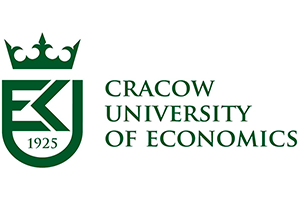Partners description and project’s cooordinators

Borys Grinchenko Kyiv University, Ukraine is a student-centered, research intensive and globally involved university with over 140-year history. Over 8 thousand students do courses in 45 majors. Long-term educational traditions and philosophy of servant leadership ensures personal development of students and staff. Building trust relationships and promoting important social values are the basis for the corporate culture of Borys Grinchenko Kyiv University.
Project Coordinator: prof. Olena Shtepa

Cracow University of Economics is one of the largest economics higher education institutions in Poland. The University’s three Colleges (College of Economics, Finance and Law, College of Management and Quality Sciences and College of Public Economy and Administration) offer all levels of educational programmes, including full-time and part-time first cycle (BA) and second cycle (MA) courses, one-tier master’s studies, PhD and post-diploma programmes.
Project Coordinator: prof. Marek Ćwiklicki

University of Foggia, Italy was founded in 1999. It actually counts on five main Departments (Agriculture, Economics, Law, Humanities, Medicine and Surgery). About 10,000 are its students, over a third are postgraduates. UNIFG offers 16 Bachelor degree programs, 15 Master’s degree courses (2yrs), numerous PhDs and internships and various Summer Schools. UNIFG is ranked among the 12 top Universities in Italy by VQR – eValuation of the Quality of Research. First university in Italy to receive the “HR Excellence in Research” Award from the European Commission in 2010 UNIFG participates actively in the European Erasmus scheme in order to promote mobility and cooperation between students and staff of different European countries. Extensive network of international exchange partners provides opportunities for students and staff to gain international experience in the wider global community. UNIFG has around 300 outgoing students and 300 incoming students.
Project Coordinator: prof. Pierpaolo Magliocca

University of Jaen, Spain was established in 1993. The University is divided into nine centres: three faculties, five colleges and a research centre. It offers undergraduate and postgraduate studies to more than 17.000 students. The UJA is characterized by carrying out quality research, contrasted in recent years with membership in considerable positions in international rankings for evaluating such research activity. On the other hand, participation in collaboration agreements and international mobility programs allows teachers, researchers, administration and service personnel and students to increase their competitive advantages, giving a multidisciplinary approach to the teaching and learning process and facilitating membership in the institution of students from other countries.
Project Coordinator: prof. Manuel Valverde Ibáñez

University of Naples Parthenope, Italy was established in 1919. In about one hundred years since its foundation, the most profound and characterizing trait of this University has remained unchanged as its most authentically traditional feature: the ability to interact with the social context and to continuously engage with its evolving demands. Particularly, Parthenope aims to develop innovative solutions to the world’s most daunting challenges. Parthenope’s research efforts are enhanced through creative collaborations with leading research universities, institutes and consortia around the world. Parthenope’s research activity is focused on the following main topics of the ERC domains: Social Sciences and Physical Sciences and Engineering. Parthenope University counts 7 Departments (Law, Engineering; Science and Technology; Movement sciences and wellbeing; Business and Quantitative Studies Department; Business and Economics; and Economics and Legal Studies).
Project Coordinator: prof. Rossella Canestrino

University of Salerno, Italy is the 1st University in Central and Southern Italy (According to the most important Italian business daily “Il Sole 24 Ore”). It has 40,000 students enrolled and it is a Campus that covers an area of 1 million and 800 thousand square meters and includes different structures such as residences, canteen, theater, sports facilities, libraries, etc. The University of Salerno has the primary objectives of ensuring advanced European-level training, promoting scientific research and supporting technology transfer.
The University of Salerno collaborates with 53 countries involved in international agreements and has 173 international agreements with these countries.
Project Coordinator: prof. Antonio Botti

Vienna University of Economics and Business, Austria was founded on 1 October 1898 as the Imperial Export Academy. With about 23,000 students (over a quarter of whom are international students) the WU today is the EU’s largest educational institution for business and economics, business law, and social sciences. Throughout its 11 departments, 16 interdisciplinary research institutes and seven competence centers, WU is committed to research excellence, responsibility and sustainability. WU’s commitment to excellence in research is based on a holistic understanding of business and economics and is also a commitment to the diversity of business- and economics related disciplines. WU sees this diversity as one of its main strengths, because it allows the university to deal with complex, transdisciplinary questions in a comprehensive manner, providing a solid basis for developing sustainable and innovative solutions for the business community and society. WU is also working to extend its worldwide network and strengthen its international position. One sign of this growing international status is WU’s triple international accreditation (by EQUIS, AACSB, and AMBA), which WU shares with only about 80 other universities worldwide.
Project Coordinator: dr David Herold
Steering Group
SG is supports and guides project partnership. It monitors quality and achievement of project activities.